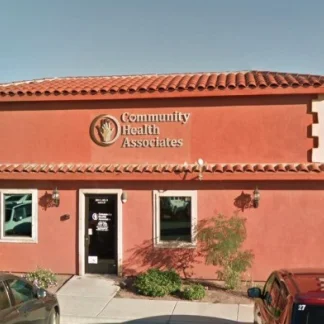Catholic Community Services
Catholic Community Services is a private rehab located in Yuma , AZ. Catholic Co...
Community Intervention Associates, located in Yuma, Arizona, provides behavioral health care services and mental health care treatment. If addiction is the primary diagnosis, clients may need to seek a referral to an alcohol or drug rehab treatment center. This location can provide outpatient addiction treatment.
Staff at Community Intervention Associates offer treatment services based on personal need and each client’s goals for recovery. Services are provided in an outpatient format.
The outpatient program at Community Intervention Associates provides in-person and telehealth services. Clients engage in individual therapy, group therapy, family therapy, case management services, care coordination services, and medication management services. Clients also have access to crisis intervention services, DUI treatment and education services, and educational programming.
Contact us for more information: (928) 376-0026

Connect with Community Intervention Associates by calling their admissions team directly.
(928) 376-0026 Website Get DirectionsResearch clearly demonstrates that recovery is far more successful and sustainable when loved ones like family members participate in rehab and substance abuse treatment. Genetic factors may be at play when it comes to drug and alcohol addiction, as well as mental health issues. Family dynamics often play a critical role in addiction triggers, and if properly educated, family members can be a strong source of support when it comes to rehabilitation.
Group therapy is any therapeutic work that happens in a group (not one-on-one). There are a number of different group therapy modalities, including support groups, experiential therapy, psycho-education, and more. Group therapy involves treatment as well as processing interaction between group members.
Trauma therapy addresses traumatic incidents from a client's past that are likely affecting their present-day experience. Trauma is often one of the primary triggers and potential causes of addiction, and can stem from child sexual abuse, domestic violence, having a parent with a mental illness, losing one or both parents at a young age, teenage or adult sexual assault, or any number of other factors. The purpose of trauma therapy is to allow a patient to process trauma and move through and past it, with the help of trained and compassionate mental health professionals.
Group therapy is any therapeutic work that happens in a group (not one-on-one). There are a number of different group therapy modalities, including support groups, experiential therapy, psycho-education, and more. Group therapy involves treatment as well as processing interaction between group members.
Trauma therapy addresses traumatic incidents from a client's past that are likely affecting their present-day experience. Trauma is often one of the primary triggers and potential causes of addiction, and can stem from child sexual abuse, domestic violence, having a parent with a mental illness, losing one or both parents at a young age, teenage or adult sexual assault, or any number of other factors. The purpose of trauma therapy is to allow a patient to process trauma and move through and past it, with the help of trained and compassionate mental health professionals.
Trauma therapy addresses traumatic incidents from a client's past that are likely affecting their present-day experience. Trauma is often one of the primary triggers and potential causes of addiction, and can stem from child sexual abuse, domestic violence, having a parent with a mental illness, losing one or both parents at a young age, teenage or adult sexual assault, or any number of other factors. The purpose of trauma therapy is to allow a patient to process trauma and move through and past it, with the help of trained and compassionate mental health professionals.
Catholic Community Services is a private rehab located in Yuma , AZ. Catholic Co...
PSA Art Awakening is a psycho-social rehabilitation program that offers outpatie...
Horizon Health and Wellness offers a full range of behavioral health services fo...
Community Bridges is a private rehab located in Yuma, Arizona. Community Bridges...